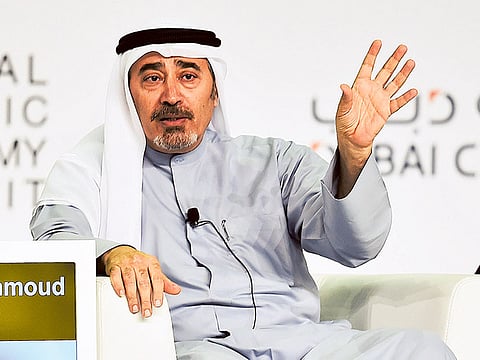UAE’s credit cycle on the mend, skips are declining
Collaborative efforts yielding results, NPLs will decline, but with a lag

Dubai: The banking sector in the UAE is going through a difficult phase as the overall credit demand has slowed down.
While the credit cycle is gradually turning, senior bankers who spoke to Gulf News expect the decline in non-performing loans (NPLs) will come with a lag.
“The economy is slowing down. It is not a secret to anybody. The world is slowing down, our region is slowing. The levels of activities at our stock exchanges are slowing. I think, despite the all-round slowdown, the economy and the financial sector remains healthy and resilient,” said, AbdulAziz Al Ghurair, Chairman, UAE Banks Federation and CEO of Mashreq.
Banks faced large NPL formation estimated in the range of Dh5 to Dh7 billion last year from loans to small and medium enterprises (SME) sector.
Senior bankers in the country say the credit cycle is turning and there have been visible improvements in overall credit quality.
“We witnessed a surge in defaults and skips last year. What we have seen is a normal credit cycle. We are in an advance stage of that cycle. Hopefully we will see a recovery by mid-2017. Banks have been prompt in making adequate provisions. From the fourth quarter of 2015, stretching into the first and second quarter of 2017 banks have been reporting large provisions following the strict central bank guidelines,” said Tirad Mahmoud, CEO, Abu Dhabi Islamic Bank, said.
Restructured
Bankers in general feel that problems within the SME sector is largely contained. Under the initiatives of The UAE Banks Federation (UBF) Dh4.5 billion of SME loans have been restructured in the first two quarters of this year, substantially reducing potential skip cases.
“We have been able to restructure these loans. It has had a positive impact on the SME sector and now they are comfortable with banks to talk about their difficulties. Under the current agreement among banks, no bank can unilaterally take any decisions on a customer in difficulty. All the banks now respect this position,” said Al Ghurair.
Banks in the UAE are operating in open economy. They face huge challenges in the face on an economic downturn when businesses facing trouble skip their loan obligations and leave the country. “It is important for the banking sector in the country to work with these businesses to restructure and come out of the situation. I think the UBF initiative is working well and the number of skips have dramatically come down and those people who have difficulty are now open to discuss it with banks way in advance,” said Al Ghurair.
Fundamental changes
Bankers say there need to be some fundamental changes in the way in which the banking relations work in the UAE. The approach towards financing and the commitment towards meeting obligations need to be changed.
“The whole concept of people skipping when they can’t keep up with the pre-agreed financial commitments is irresponsibility. Banks don’t benefit by putting someone behind bars, there is no good outcome in such scenario. Banks benefit when we get full cooperation from the clients in resolving their difficulties. Even in the case of insolvency, trust and a sense of partnership is important in turn the situation around,” said ADIB’s Mahmoud.
Clearly banks have changed their approach towards businesses in trouble. “Legal action is normally the last resort, to protect bank’s interest and that is resorted to protect public’s money. After all, bank’s money belongs to the public and the bank managements have a responsibility to protect the public’s interests,” said Mahmoud.
Sign up for the Daily Briefing
Get the latest news and updates straight to your inbox


